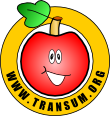
 |
Exam-Style Questions.Problems adapted from questions set for previous Mathematics exams. |
1. | GCSE Higher |
If the universal set is the set of positive even numbers less than 30 and:
$$A = \{4, 8, 12, 16, 20, 24, 28\}$$ $$B = \{6, 12, 18, 24, 28\}$$(a) Complete the Venn diagram with this information.
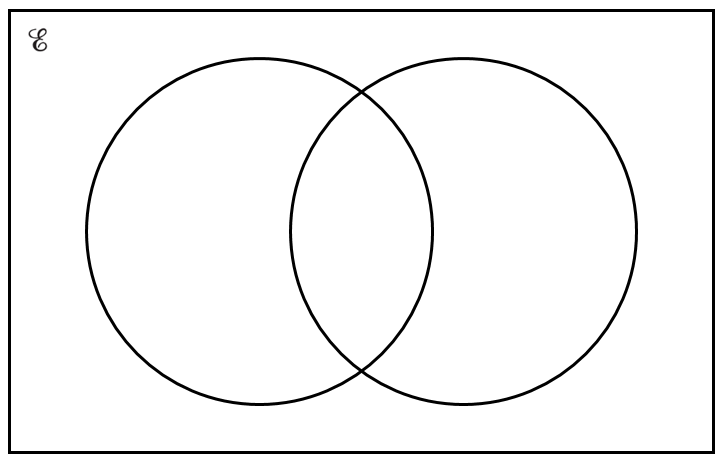
A number is chosen at random from the universal set.
(b) What is the probability that the number is in the set \(A \cap B\)?
2. | GCSE Higher |
(a) Complete the Venn diagram with the following information.
$$\mathscr{E}= \{1,2,3,4,5,6,7,8,9,10,11,12\}$$ $$A = \{ \text{odd numbers}\}$$ $$B = \{ \text{factors of 24} \}$$(a) Complete the Venn diagram with this information.

A number is chosen at random from the universal set.
(b) What is the probability that the number is in the set \(A \cap B\)?
3. | GCSE Higher |
(a) Complete the Venn diagram to represent this information:
$$\mathscr{E} = \{-4, -3, -2, -1, 0, 1, 2, 3, 4\}$$ $$A = \{1,2,3,4\}$$ $$B = \{-4,-2,2,4\}$$
A number is chosen at random from the universal set \( \mathscr{E} \).
(b) What is the probability that the number is in the set \(A \cap B\)?
4. | GCSE Higher |
The midnight train to Georgia is not the most reliable. The probability that the train will be late on any day is 0.35
(a) Complete the probability tree diagram for Monday and Tuesday.
Monday Tuesday
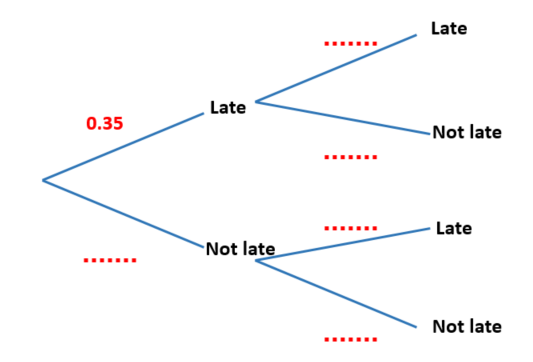
(b) Work out the probability that the train will be late on at least one of these two days.
5. | GCSE Higher |
Near Blizzard Lodge on any day the probability that it snows is \( \frac{1}{4} \).
When it snows the probability that Angus goes skiing is \( \frac{4}{7} \).
When it does not snow the probability that Angus goes skiing is \( \frac{2}{5} \).
(a) In a period of 80 days on how many days is it expected to snow?
(b) Complete the tree diagram.
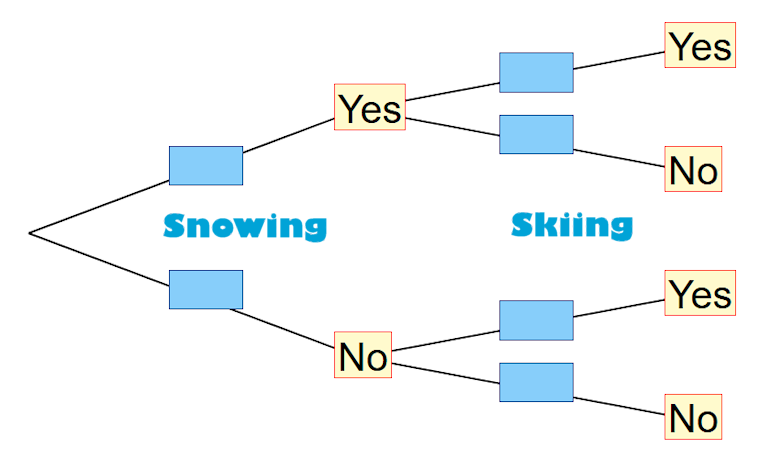
(c) Find the probability that on any day Angus goes skiing.
6. | GCSE Higher |
(a) There are 24 people at a Football Club supporters' meeting in Dudley. Thirteen of them are female.
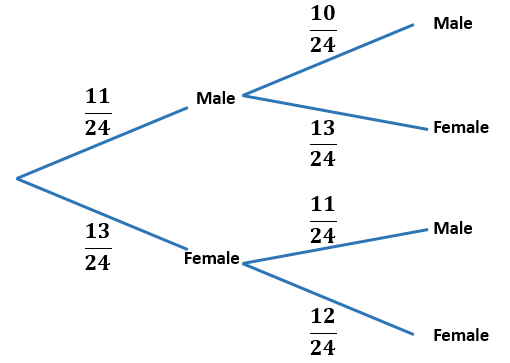
First chosen Second chosen
Tracey draws the tree diagram above to show how two people could be chosen from the meeting at random. What is wrong with the probabilities shown on the diagram?
(b) Aynuk and Ayli play for Dudley Casuals Football Club. The probabilities that they will score a goal in the next match are 0.2 and 0.35 respectively.
The manager thinks that the probability that both players will score a goal in the next match is 0.2 + 0.35. Is the manager correct? Give reasons for your answer.
7. | GCSE Higher |
Mrs Gill wants to give her nephew two sweets from a jar she keeps on her kitchen table. There are 11 sweets in this jar.
Calculate the probability that Mrs Gill will take a sweet of each colour if she takes two sweets randomly from the jar.
Show all of your working.
8. | GCSE Higher |
A driving test has two sections, practical(p) and theory(t). One day everyone who took the test passed at least one section. 77% passed the practical section and 81% passed the theory section.
(a) Represent this information on a Venn diagram showing the percentage of candidates in each section of the diagram.
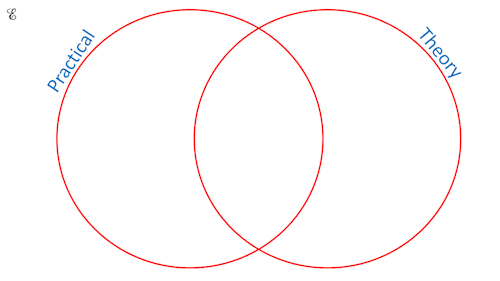
One person is chosen at random from all the people who took the test that day. What is the probability that this person:
(b) passed the practical section, given that they passed the theory section,
(c) passed the theory section, given that they passed only one section?
9. | GCSE Higher |
The Venn diagram represents a collection of 40 books on sale in an online store.
P represents the books available in paperback format.
D represents the books available in digital format.
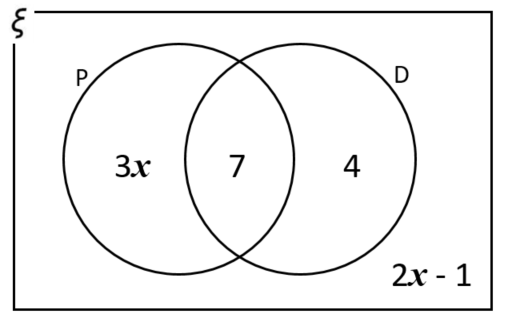
(a) One book from the collection is picked at random. Work out the probability that the book is available in digital format.
(b) One of the books that is available in paperback format is picked at random. Work out the probability that this book is also available in digital format.
10. | GCSE Higher |
A box contains only green and yellow crayons.
Luka takes one crayon at random from the box. The probability that she takes a green crayon is \(\frac16\).
Luka returns the crayon to the bag and adds four more green crayons to the box. The probability that she takes one green crayon at random is now \(\frac14\).
How many crayons of each colour were originally in the box?
11. | GCSE Higher |
At an international conference there were 300 delegates from both the northern and southern hemispheres. Each delegate wore a t-shirt in one of three different colours:
The table gives some information about the delegates.
| T-shirt colour | Total | |||
|---|---|---|---|---|
| Red | Blue | Green | ||
| Northern | 76 | 190 | ||
| Southern | 36 | 25 | 110 | |
| Total | 105 | 101 | 300 | |
(a) Complete the table.
(b) Find the probability that one of these delegates chosen at random wears a red t-shirt.
(c) Two of these delegates are chosen at random.
Find the probability that they are both from the southern hemisphere.
(d) Two of the delegates from the southern hemisphere are chosen at random.
Find the probability that they both were born after 2012.
(e) Two of the Generation Z delegates are chosen at random.
Find the probability that one is from the northern hemisphere and the other is from the southern hemisphere.
12. | GCSE Higher |
Lisa's nephew Sean has two boxes containing plastic building bricks.
A red box contains 5 green bricks and 10 yellow bricks.
A blue box contains 8 green bricks and 16 yellow bricks.
Lisa picks a brick at random from the red box and puts it into the blue box.
Sean now picks a brick at random from the blue box. Show that:
P(Lisa picks a green brick) = P(Sean picks a green brick)
13. | GCSE Higher |
(a) Use set notation to describe the shaded region in the Venn diagram on the left.
(b) Shade the region in the Venn diagram in the centre that represents \( C \cap D' \)
(c) Shade the region in the Venn diagram on the right that represents \( (E \cap F) \cup G' \)

14. | GCSE Higher |
80 students are asked if they like History (\(H\)) and if they like Geography (\(G\)).
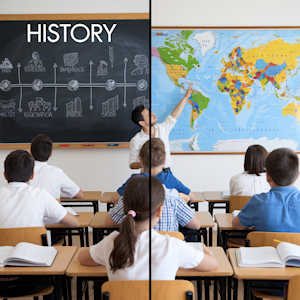
7 say they do not like History and do not like Geography.
45 say they like History.
54 say they like Geography.
(a) Draw a Venn diagram to represent this situation.
A student is chosen at random.
(b) Find the probability that this student likes History and likes Geography.
Two students are chosen at random.
(c) Find the probability that they both like Geography.
Two students who like History are chosen at random.
(d) Find the probability that they both also like Geography.
15. | IB Studies |
Twenty nine children went to a zoo to photograph some animals. The numbers of children who photographed Lions(L), Monkeys(M) and Zebras (Z) are given as follows:
(a) Draw a Venn diagram to show this information.
All of the children photographed at least one of the three types of animal.
(b) Find the number of children that photographed Monkeys and Zebras but not Lions.
(c) Calculate the probability that a child chosen at random from the group photographed a Lion.
(d) Calculate the probability that a child chosen at random from the group photographed only one of the three types of animal.
(e) Calculate the probability that a child chosen at random from the group photographed only Lions, given that they saw only one of the three types of animal.
(f) If a child chosen at random from the group photographed the Lions, find the probability that they also photographed the Monkeys.
16. | IB Studies |
Neal is attending a Scout jamboree in Japan. He has both boots and trainers to wear. He also has the choice of wearing a cap or not.
The probability Neal wears boots is 0.4. If he wears boots, the probability that he wears a cap is 0.7.
If Neal wears trainers, the probability that he wears a cap is 0.25.
The following tree diagram shows the probabilities for Neal's clothing options at the jamboree.
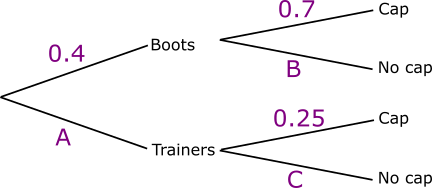
(a) Find the value of A.
(b) Find the value of B.
(c) Find the value of C.
(d) Calculate the probability that Neal wears trainers and no cap.
(e) Calculate the probability that Neal wears no cap.
(f) Calculate the probability that Neal wears trainers given that he is not wearing a cap.
(g) Calculate the probability that Neal wears boots on the first two days of the jamboree.
(h) Calculate the probability that Neal wears boots on one of the first two days, and trainers on the other.
17. | IB Standard |
Let \(J\) and \(T\) be independent events, where \(P(J)=0.4\) and \(P(T)=0.7\).
(a) Find \(P(J\cap T)\).
(b) Find \(P(J\cup T)\).
(c) Draw a two-set Venn diagram and shade the region that represents \(J\cap T'\).
(d) Find \(P(J\cap T')\).
18. | GCSE Higher |

On the day after one GCSE paper Twitter and the media were buzzing with comments about a particular question about Hannah's sweets. Here is the Transum version of this now famous Maths exam question:
Hannah has 6 orange sweets and some yellow sweets.
Overall, she has \(n\) sweets.
The probability of her taking 2 orange sweets is \(\frac13\).
Prove that: \(n^2-n-90=0\)
Hence or otherwise find \(n\).
19. | GCSE Higher |
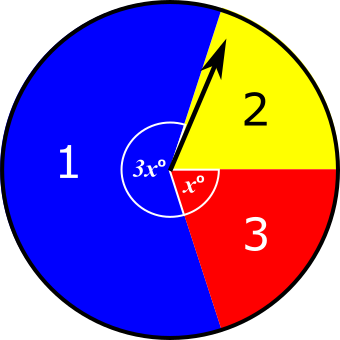
When the arrow is spun once on this spinner, a 1 or a 2 or a 3 can be scored depending on the colour the arrow lands on.
Aimee is going to spin the arrow twice. She will work out her total score by adding the two scores she gets on the two spins. The probability that she will get a total score of 4 is \(\frac{7}{25}\)
Find the value of \(x\).
20. | IB Analysis and Approaches |
Let A and B be events such that \(P (A) = 0.45\) , \(P (B) = 0.35\) and \(P (A \cup B) = 0.5\).
Find \(P (A \mid B) \).
21. | IB Analysis and Approaches |
Bag A contains 6 green tickets and 5 blue tickets.
Bag B contains 4 green tickets and 1 blue tickets.
(a) A bag is chosen at random and a ticket is drawn. Find the probability that the ticket is green.
Let J be the event that "bag A is chosen" and let K be the event that "a green ticket is drawn".
(b) Determine whether events J and K are independent.
22. | IB Studies |
Sumville has three newspapers: The Chronicle, The Express and Moon, and The Scribe.
It has been found that
(a) Draw a Venn diagram to represent this information. Label A the set that represents The Chronicle readers, B the set that represents The Express and Moon readers, and C the set that represents The Scribe readers.
(b) What percentage of the population does not read any of the three newspapers?
(c) Find the percentage of the population that reads exactly one newspaper.
(d) Find the percentage of the population that reads The Chronicle or The Express and Moon but not The Scribe.
A local radio station states that 71% of the population reads either The Express and Moon or The Scribe.
(e) Use your Venn diagram to decide whether the statement is true and justify your answer.
The population of Sumville is 180 000. The local radio station claimed that 65 000 of the town’s citizens read at least two of the local newspapers.
(f) Find the percentage error in this claim.
23. | IB Standard |
The Venn diagram below shows the events \(A\) and \(B\), and the probabilities p, q and r.
It is known that \({\rm{P}}(A) = 0.43\) , \({\rm{P}}(B) = 0.62\) and \({\rm{P}}(A \cap B) = 0.27\) .
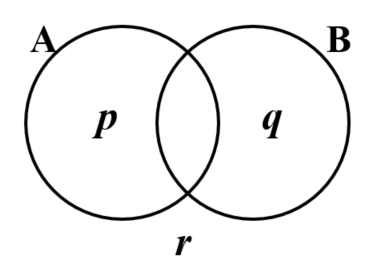
(a) Calculate the value of p.
(b) Calculate the value of q.
(c) Calculate the value of r.
(d) Find the value of \({\rm{P}}(A|B')\)
(e) Hence, or otherwise, show that the events \(A\) and \(B\) are not independent.
24. | IB Analysis and Approaches |
Events \(A\) and \(B\) are such that \(P(A) = 0.25\), \(P(A|B) = 0.15\) and \(P(A \cup B) = 0.65\).
Find \(P(B)\)
25. | IB Studies |
900 professional footballers were surveyed with the following results
(a) Draw a Venn diagram to show this information. Use P to represent the set of footballers who have a swimming pool, H the set of footballers who have a second home and B the set of footballers who have a boat.
(b) Write down the number of footballers that have a swimming pool only;
(c) Write down the number of footballers that have a swimming pool and a boat but no second home.
(d) Write down \(n[B\cap (H\cup P)']\).
(e) Calculate the number of footballers who have none of the three.
Two footballers are chosen at random from the 900 footballers. Calculate the probability that:
(f) neither footballer has a swimming pool;
(g) only one of the footballers has a swimming pool.
The footballers are asked to collect money for charity. In the first month, the footballers collect \(x\) pounds and then they collect \(y\) pounds in each subsequent month.
In the first 6 months, they collect 15700 pounds. This can be represented by the equation \(x + 5y = 15700\).
In the first 10 months they collect 25700 pounds.
(h) Write down a second equation in \(x\) and \(y\) to represent this information.
(i) Write down the value of \(x\) and of \(y\).
(j) Calculate the number of months that it will take them to collect at least 50000 pounds.
26. | IB Studies |
Julie chooses a cake from a yellow box on a shelf. The box contains two chocolate cakes and three plain cakes. She eats the cake and chooses another one from the box. The tree diagram below represents the situation with the four possible outcomes where C stands for chocolate cake and P for plain cake.
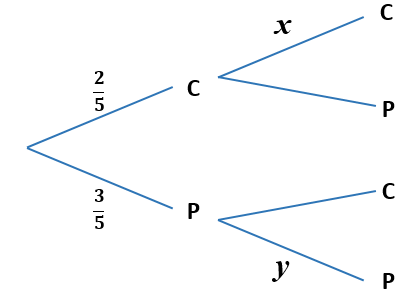
(a) Write down the value of \(x\).
(b) Write down the value of \(y\).
(c) Find the probability that both cakes are plain.
On another shelf there are two boxes, one red and one green. The red box contains four chocolate cakes and five plain cakes and the green box contains three chocolate cakes and four plain cakes. Ben randomly chooses either the red or the green box and randomly selects a cake.
(d) Copy and complete the tree diagram below.
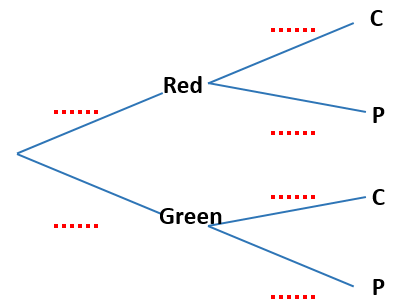
(e) Find the probability that he chooses a chocolate cake.
(f) Find the probability that he chooses a cake from the red box given that it is a chocolate cake.
27. | IB Standard |
Jane and David play two games of golf. The probability that Jane wins the first game is \(\frac56\). If Jane wins the first game, the probability that she wins the second game is \(\frac67\).
If Jane loses the first game, the probability that she wins the second game is \(\frac34\)
(a) Copy and complete the following tree diagram.
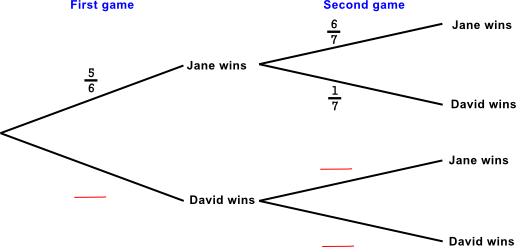
(b) Find the probability that Jane wins the first game and David wins the second game.
(c) Find the probability that David wins at least one game.
(d) Given that David wins at least one game, find the probability that he wins both games.
28. | IB Analysis and Approaches |
At a fitness club, \( 60\% \) of the members are full-time members, and \( 30\% \) of the members participate in group fitness classes. \( 25\% \) of the members are neither full-time members nor participate in group fitness classes.
A member is selected at random.
(a) Find the probability that the member is a full-time member and participates in group fitness classes.
(b) Find the probability that the member participates in group fitness classes, but is not a full-time member.
In the club, \( 50\% \) of the members are male, and \( 40\% \) of the male members participate in group fitness classes.
A member is selected at random. Let \( M \) be the event "the member is male" and let \( F \) be the event "the member participates in group fitness classes".
(c) Find \( P(M \cap F) \).
(d) Determine if the events \( M \) and \( F \) are independent. Justify your answer.

29. | A-Level |
Mathsland's national currency comes in denominations of 1 unit, 5 units, 10 units and 50 units. Sofya places this collection of these coins in her purse then, without looking, takes out two coins at random, one after the other.
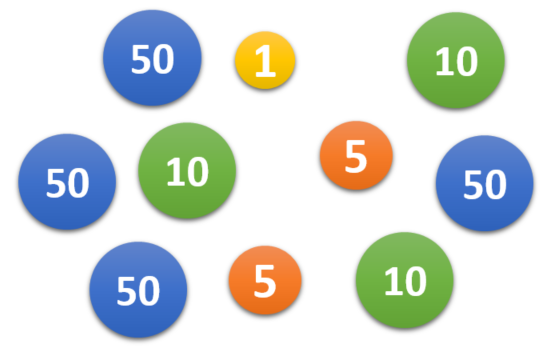
Draw a tree diagram to represent the situation and then use it to calculate the probability that the second coin that Sofya takes out of her purse has a greater value than the first.
30. | IB Standard |
Two events A and B are such that \(P(A) = 0.57\) and \(P (A \cap B) = 0.21\).
(a) Find \(P (A \cap B' ) \).
(b) Given that \(P((A \cup B)') = 0.17 \), find \(P(A|B')\).
31. | IB Analysis and Approaches |
Some orange fish and green fish are swimming in a large tank in the enterance to a restaurant. The number of orange fish is a single digit number as is the number of green fish.
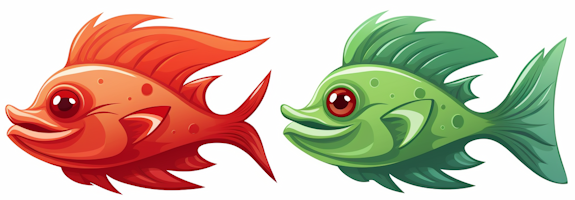
The chef occasionally takes a fish from the tank at random. So far today he has taken out two fish.
The tank initially contains r orange fish and g green fish.
Let \( P(GG) \) represent the probability of drawing two green fish from the tank without replacement.
It is known that \( P(GG) = \frac{1}{5} \).
(a) Show that \( 4g^2 - (4 + 2r)g + r - r^2 = 0 \).
(b) By solving the equation in part (a), show that \( g = \dfrac{(2+r) \pm \sqrt{5r^2 + 4}}{4} \).
(c) Find two pairs of values for r and g that satisfy the condition \( P(GG) = \frac{1}{5} \).
On a different day the chef randomly takes three fish out of the tank. The tank initially contained 10 orange fish and g green fish.
Let \( P(GGG) \) represent the probability of taking three green fish from the tank without replacement.
(d) Find an expression for \( P(GGG) \) in terms of g.
A green fish is added so that the tank now contains 10 orange fish and \( g + 1 \) green fish. The probability of taking three green fish from the tank without replacement is now twice the probability expressed in part (d).
(e) Find the initial number of green fish in the tank on this particular day.
If you would like space on the right of the question to write out the solution try this Thinning Feature. It will collapse the text into the left half of your screen but large diagrams will remain unchanged.
The exam-style questions appearing on this site are based on those set in previous examinations (or sample assessment papers for future examinations) by the major examination boards. The wording, diagrams and figures used in these questions have been changed from the originals so that students can have fresh, relevant problem solving practice even if they have previously worked through the related exam paper.
The solutions to the questions on this website are only available to those who have a Transum Subscription.
Exam-Style Questions Main Page
To search the entire Transum website use the search box in the grey area below.